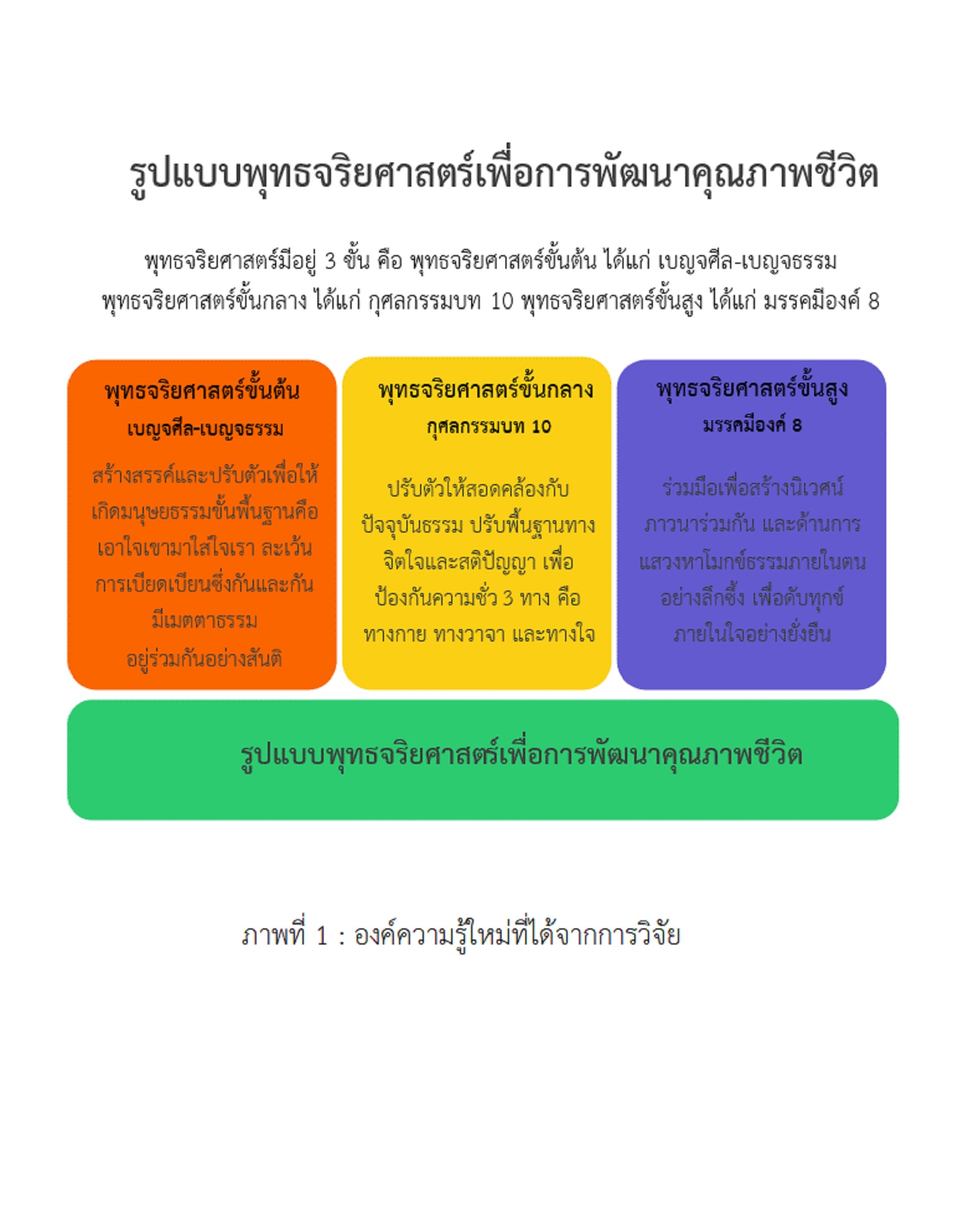Buddhist Ethics for Quality of Life Development according to Moderate Postmodern Philosophy
Keywords:
Buddhist Ethics, Moderate Postmodern Philosophy, Quality of Life, DevelopmentAbstract
This research is a qualitative study conducted through document analysis with the following objectives: 1) To study Buddhist ethics. 2) To study the quality of life development according to moderate postmodern philosophy. 3) To analyze Buddhist Ethics for Quality of Life Development. The research findings are as follows: 1. Buddhist ethics consist of three levels : Basic Buddhist ethics, which include the Sila - Dhamma, Intermediate Buddhist ethics, which involve the practice of Ten Paramitas, Advanced Buddhist ethics, which entail the cultivation of the Eightfold Noble Path. 2. The quality of life according to moderate postmodern philosophy emphasizes present happiness and promotes creativity or altruism to benefit collective well-being. It aims for personal and societal development to the fullest extent. 3. Analysis of Buddhist ethics for life quality development reveals: Basic Buddhist ethics promote a life quality aligned with the principles of postmodern middle way philosophy, focusing on creativity and adaptation to foster fundamental human values such as compassion, tolerance, and peaceful coexistence. Intermediate Buddhist ethics encourage a life quality in line with the principles of postmodern middle way philosophy through mental and intellectual adaptation to prevent wrongdoing in three aspects: physical, verbal, and mental. Advanced Buddhist ethics advocate for a life quality consistent with the principles of postmodern middle way philosophy by fostering cooperation to create a harmonious environment collectively and seeking inner spiritual enlightenment to alleviate suffering permanently.
References
ชัยโรจน์ นพเฉลิมโรจน์. (2565). การคิดนวัตกรรมด้วยหลักการทรงงานตามหลักปรัชญาหลังนวยุค. วารสารการวิจัยเพื่อพัฒนาชุมชน (มนุษย์ศาสตร์และสังคมศาสตร์), 15(2), 111-117.
บุญวัฒน์ บุญทะวงศ์. (2565). นางหาบ: พุทธจริยศาสตร์จิตอาสา. วารสารวิจัยและพัฒนา มหาวิทยาลัยราชภัฏเลย, 17(61), 1-6.
พระครูกิตติโพธิสาร กิตติปัญโญ และคณะ. (2565). การวิเคราะห์พุทธจริยศาสตร์ในประเพณีบุญซำฮะของตำบลป่าหวายนั่ง อำเภอบ้านฝาง จังหวัดขอนแก่น. วารสารบัณฑิตศึกษามหาจุฬาขอนแก่น, 9(1), 167-160.
พระครูสิริประภัสสรคุณ ปภสฺสโร (ดงมีศรี), สมเดช นามเกตุ และ บุญส่ง สินธุ์นอก. (2566). การปลูกฝังจิตอาสาและจิตสำนึกในองค์กรทางคุณธรรมจริยธรรมในสังคม. Journal of Modern Learning Development, 8(7), 383-396.
พระมหาณัฐพันธ์ สุทสฺสนวิภาณ และคณะ. (2566). พุทธจริยศาสตร์กับการดูแลผู้ป่วยมะเร็งระยะสุดท้าย. Journal of Roi Kaensarn Academi, 8(5), 608-619.
พระมหายิ่งสันต์ ภทฺราภิสิทฺธิ(กมลสาร), พระมหาสากล สุภรเมธี และพระใบฎีกานรินทร์ สีลเตโช. (2565). การศึกษาวิเคราะห์วิบากกรรมของเปรตตามหลักพุทธจริยศาสตร์. วารสารมหาวิทยาลัยมหามกุฏราชวิทยาลัย วิทยาเขตร้อยเอ็ด, 11(2), 713-723.
พิชัย สุขวุ่น. (2558). กระบวนทรรศน์หลังนวยุคในปรัชญาศิลปะของท่านพุทธทาสภิกขุ, การศึกษาเชิงวิเคราะห์ วิจักษ์ และวิธาน. วารมนุษย์ศาสตร์และสังคมศาสตร์, 7(3), 33-61.
ศุภมา จิตต์เที่ยง และ ธวัชชัย ผลสะอาด. (2566). แนวทางการนำหลักพุทธจริยธรรมมาใช้พัฒนาผู้นำทางการเมือง. วารสารพุทธนวัตกรรมและการจัดการ, 6(6), 227-237.

Downloads
Published
How to Cite
Issue
Section
License
Copyright (c) 2024 Institute of Sufficiency Journal

This work is licensed under a Creative Commons Attribution-NonCommercial-NoDerivatives 4.0 International License.



